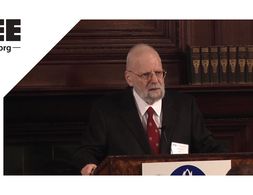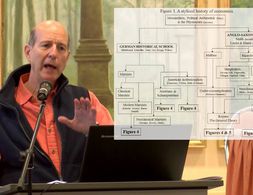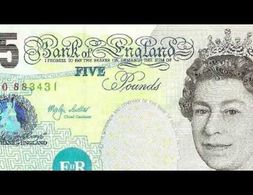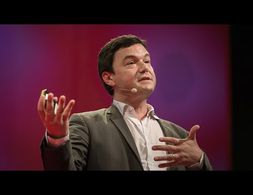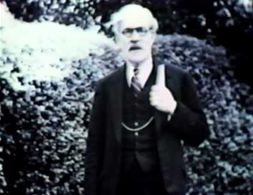399 Ergebnisse
Austrian economics focuses on the economic coordination of individuals in a market economy. Austrian economics emphasises individualism, subjectivism, laissez-faire politics, uncertainty and the role of the entrepreneur, amongst others.
Post-Keynesians focus on the analysis of capitalist economies, perceived as highly productive, but unstable and conflictive systems. Economic activity is determined by effective demand, which is typically insufficient to generate full employment and full utilisation of capacity.
A historical glimpse of how economists of the 19th century debated the usefulness of mathematics to economics
The Great Recession 2.0 is unfolding before our very eyes. It is still in its early phase. But dynamics have been set in motion that are not easily stopped, or even slowed. If the virus effect were resolved by early summer—as some politicians wishfully believe—the economic dynamics set in motion would still continue. The US and global economies have been seriously ‘wounded’ and will not recover easily or soon. Those who believe it will be a ‘V-shape’ recovery are deluding themselves. Economists among them should know better but are among the most confused. They only need to look at historical parallels to convince themselves otherwise.
The article compares market fundamentalism and right-wing populism on the basis of its core patterns of thinking and reasoning. Based on an analysis of important texts in both fields we find many similarities of these two concepts in their "inner images". Thus, we develop a scheme of the similar dual social worlds of right-wing-populism and market fundamentalism and offer some recent examples of market fundamentalism and right-wing populism mutually reinforcing each other or serving as a gateway for each other. We then apply our scheme for the analysis of the recent political developments and its ideological roots in the US under Donald Trump.
The concept of financialisation has undergone a similar career as ‘globalisation’, ‘neoliberalism’ or even ‘capitalism’, in the course of which it changed from the explanandum to the explanans; the process of financialisation is taken for granted, while the concrete historical and empirical causal conditions of its realisation and perpetuation are being moved into the background.
Neoclassical economics focuses on the allocation of scarce resources. Economic analysis is mainly concerned with determining the efficient allocation of resources in order to increase welfare.
Markets are the focus in modern economics: when they work, when they don’t and what we can or can’t do about it. There are many ways to study markets and how we do so will inevitably affect our conclusions about them, including policy recommendations which can influence governments and other major organisations. Pluralism can be a vital corrective to enacting real policies based on only one perspective and a plethora of approaches provide alternatives to the canonical view. Although they have differing implications, these approaches share the idea that we should take a historical approach, analysing markets on a case-by-case basis; and they share a faith in the power of both individuals and collectives to overcome the problems encountered when organising economic activity.
The relationship between race and capitalism is one of the most enduring and controversial historical debates. The concept of racial capitalism offers a way out of this impasse.
In this lecture, Prof. Israel Kirzner presents a historical overview of the development of the Austrian school. The talk covers a timespan from the beginnings of the Austrian School in the early 1870's till just before the more recent 'revival' of the School in the mid-1970's.
Identify the historical and cultural systems driving globalization and changing societies around the world.
A comprehensive textbook on contemporary Global Political Economy and its historical evolution providing a broad-ranging and even-handed introduction to the subject by covering traditional elements (such as trade and finance) while also analysing issues such as gender, environment and labour.
This course introduces students to political economy and the history of economic thought. We will cover the core ideas in various schools of economic thought, positioning them in the historical and institutional context in which they were developed. In particular, we will cover some economic ideas from the ancient world and the middle ages; the enlightenment; the emergence of and main ideas in classical political economy (Adam Smith, David Ricardo, Thomas Malthus, and others); Marx, Mill, and Keynes; European versus American economic thought through history; the rise of mathematical economics; economic theories around state-managed economies versus socialism; Austrian economics; behavioral economics; and the future of economics.
The most influential and controversial economist of the twentieth century, John Maynard Keynes was the leading founder of modern macroeconomics, and was also an important historical figure as a critic of the Versailles Peace Treaty after World War I and an architect of the Bretton Woods international monetary system after World War II.
The Currency of Politics explains why only through greater awareness of the historical limits of monetary politics can we begin to articulate more democratic conceptions of money.
Professor Jennifer Clapp explains the dynamics of financialization of land and agricultural commodities in Subsaharan Africa. She points to the historical roots of accelerated land speculation and their connection to financial institutions, both generating and reinforcing the process of financialization of African land. Besides talking about roots and dynamics of speculation with land on financial markets, she puts the perspective of scholarly investigation onto the investor's side in discussing guidelines of responsible investment and regulation in the front instead of focussing on the receiving countries.
What does GDP measure? How was it constructed and how did it become so important? What are alternatives? A historical introduction into the critique of GDP as measure of economic welfare.
Tom Palley provides a very clear and insightful description of the post-Keynesian school of economics by tracing back its connections to the different historical schools of thought.
As the Covid-19 fueled economic downturn begins to intensify this winter, an extended study of the Italian cooperative sector’s historical resilience in times of crisis can serve as a learning experience for other countries seeking to create policies that foster more stable economies, with job security, care for marginalized communities and adequate counter-cyclical policies. Particularly, the Italian cooperative sector’s contributions to three aspects should be noted in closing. Firstly, the innovative phenomenon of cooperative enterprises has contributed to social inclusion of immigrant communities, the activation of youth, the unemployed and people with disabilities, a true compensation for both a market and state failure. Secondly, they have contributed to a reduction in income and wealth inequalities at a time when the issue of inequality is of global significance. Thirdly, the Italian cooperative movement has helped local communities revitalize in the face of demographic shifts and rendered them more resilient to the ravages of globalization. Each of these in their own right is a remarkable achievement.
How was money actually invented? Where does it come from? In this first episode of a video lecture, Dirk Bezemer from the University of Groningen presents the origins of money and how it's related to debt. It's a basic historical review and you can get an idea of how money is created and how banks work. The following episodes aim at giving an overview of the last debt crisis.
The economist Thomas Piketty presents a central argument of his book Capital in the Twenty-First century: if the rate of return to capital generally exceeds an economy's growth rate, this leads to a higher concentration of wealth in the long run. He furthermore shows with historical data how wealth and income inequality increased within the past decades.
In this radio interview, Philip Mirowski, author of the book "Never Let a Serious Crisis Go to Waste" presents several differences between neoclassical economics and neoliberalism. Apart from a historical outline, Mirowski primarily discusses different perceptions of markets and the role of the state. Mirowski further reflects on the role think tanks ("part of the "neoliberal thought collective") and the entrepreneurial self (the "neoliberal agent") in the spreading and fostering of the neoliberalism.
The documentary proceeds along the lines of Karl Marx' biography, inquiring into his workings as a journalist, social scientist, revolutionary and historian and his travels through Europe. In chronological order historical events, such as the 1848 revolution or the Paris Commune as well as concepts such as dialectics, the labour theory of value or the reform-revolution debate are revisited. The documentary is narrated by John Kenneth Galbraith and by an actor, who plays Marx and recites quotes from his writings.
First historical instances of colonialism such as the crusades are revisited. Then a lengthy account of the colonial experience of the Spanish Kingdom in South America and of the British Empire in India is given. The Indian case is illustrated with large amounts of archival materials from a colonial administrator. There the workings of the colonial bureaucracy and law and its (positive) achievements as well as the ignorance and arrogance of the external rulers are demonstrated. After narrating the Indian independence to some depth some recent colonial wars (Algeria, Vietnam, Congo, Angola) are briefly examined. In the end, the impact of colonialism on current, i.e. 1970s, (economic) international relations is discussed. The general tenor is that colonialism is a dysfunctional system. Still, agency is mostly placed with the empire rather than with the ruled.
John K. Galbraith tells the economic history of a couple of economies (mostly UK, US and to a lesser extent Germany) from the end of the first world war until the Bretton Woods conference. He also provides a biography of John M. Keynes and outlines some central ideas of Keynes such as the possibility of an underemployment equilibrium. Galbraith complements the historical remarks by the biographical experiences he made in economic management (and in engaging with Keynes) serving as deputy head of the Office for Price administration during the second world war.
In this radio program, the anthropologist David Graeber, explores the history of debt in (currently) 12 episodes. The program is based on his book Debt: The First 5000 Years. First, Graeber asks the questions of how debt and money are characterized, which meaning and roles they had in different historic episodes and how they were interrelated. In the most recent episodes, Graeber elaborates on how debt shaped society. He argues that debt had a different moral status in different times of history, one session analyses the current financial and economic crisis and the role of credit in this historical context.
This text provides an overview of feminist perspectives on various kinds of work and reproductive labour. The authors start at the intersection of Marxism and Feminism. They, then, give a historical background on the United States feminist movement. They, finally, provide alternative perspectives on work and reproductive labor that are not based on Marxist Feminist theory.
The MINE website explores the interplay between nature and economy. Focusing on such fundamental concepts as time, thermodynamics, evolution, homo politicus and justice, a new outline of economic activity emerges within nature. The dominant approach of Mainstream Economics, which considers nature as a subsystem of the economy, is thus replaced by a broader and more integrated framework. The visual map and its links between concepts provides an orientation. The visitor can approach the content from their own starting point and follow their own path to discovery. Each concept starts with the historical background and moves on through theory and practice.
The research behind MINE began in the 1970s at the University of Heidelberg, Germany, in an interdisciplinary group spearheaded by Professor Malte Faber, including scientists from economics to mathematics, physics and philosophy. The research has contributed to the field of Ecological Economics.
MINE is directed at students, scientists and decion-makers. More on http://nature-economy.de/faq/
This Blog Post describes the U.S. federal reserve money system from the perspective of the Modern Monetary Theory (MMT). Therefore it presents a theory of money creation, gives simple examples how this influences the economy and the historical process of why the monetary system of the US has developed this way.
Based on a paper by Jason Hickel and Giorgos Kallis Decoupling refers to the separation of economic value creation material extraction and pollution. Ecological limits pose a challenge to growth-led development and the low historical and predicted rate of decoupling suggests that long-term sustainable growth-led development is impossible.
In order to address discrimination, we must understand and address its fundamental basis of systemic oppression. Stratification economics goes beyond myopic mainstream conceptualisations of discrimination and recognises the historical, institutional, and structural factors that create and maintain socioeconomic disparities and hierarchies. To critically approach the economics of discrimination, this workshop will focus on stratification economics, a systematic and empirically grounded approach to addressing intergroup inequality (Darity, 2005). Focusing on racial discrimination, we will discuss the core elements of stratification economics, critically evaluate its relevance, and apply these understandings to construct case studies and solutions for change. In our discussions, we will consider an array of topics, including intersecting oppressions, reparative justice, and the role of knowledge production in overcoming injustice and creating a better world.
In the course Sociology and Socialism, students engage with classical theories of socialism as well as their applications in a variety of historical and international contexts. Staunchly interdisciplinary, the course utilizes expertise in philosophy, history, economics, sociology, anthropology and political theory.
Wir nutzen Cookies. Klicke auf "Akzeptieren" um uns dabei zu helfen, Exploring Economics immer besser zu machen!










